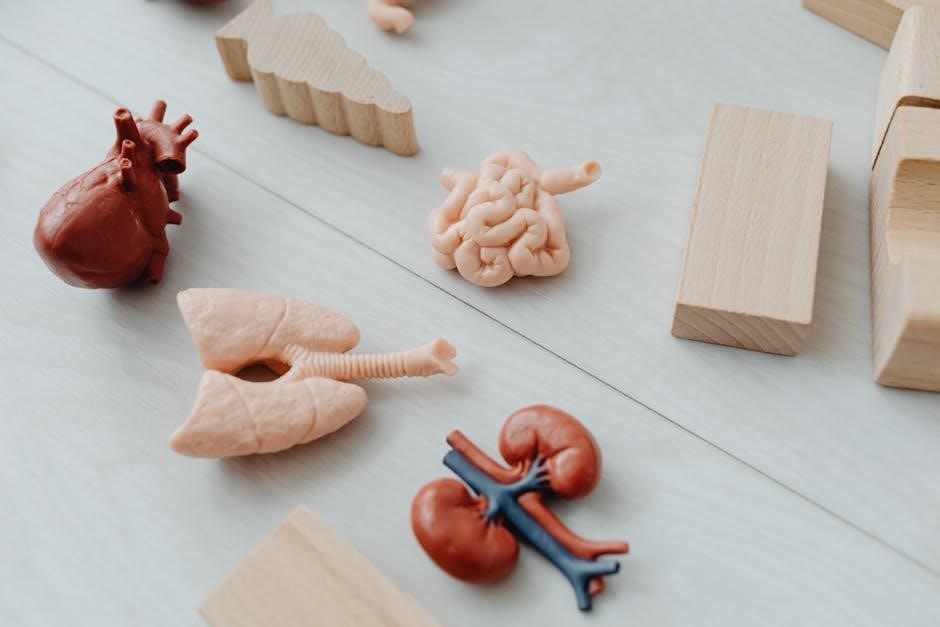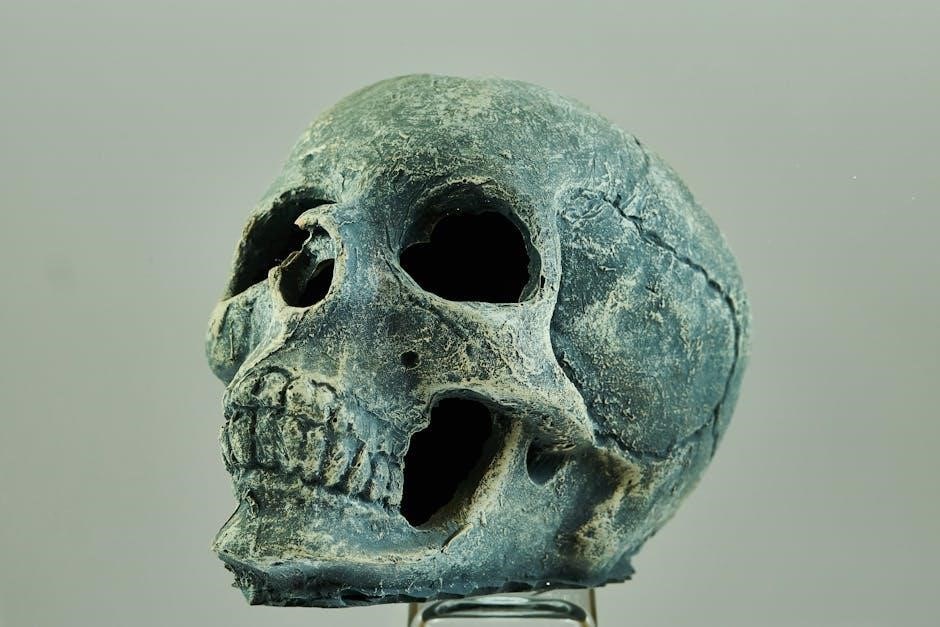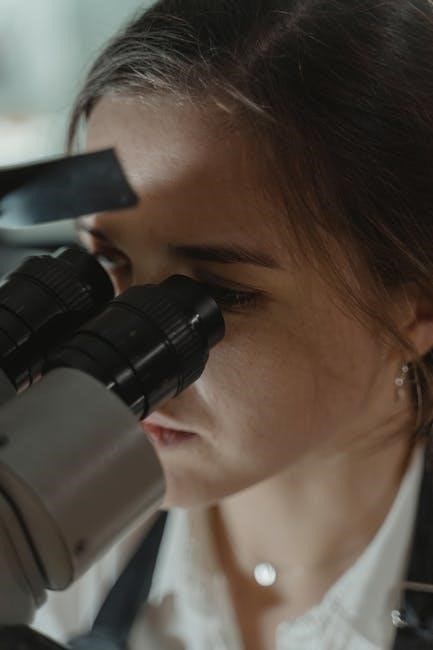This guide provides comprehensive preparation for the TEAS 7 Science section, covering anatomy, biology, chemistry, and scientific reasoning. Free PDF resources and practice tests are included to enhance your study experience. Master key concepts, improve test-taking strategies, and gain confidence with detailed explanations and real-world examples.
Start your journey to success with this essential study tool, designed to help you excel in your nursing entrance exam preparation;
1.1 Overview of the TEAS 7 Exam
The TEAS 7 exam is a standardized test for nursing school admissions, assessing knowledge in reading, math, science, and English. The science section includes 50 questions in 60 minutes, covering anatomy, physiology, biology, chemistry, and scientific reasoning. It evaluates critical thinking and problem-solving skills. Free PDF study guides and practice tests are widely available to help candidates prepare effectively. Understanding the exam structure and content is key to achieving a high score and securing admission to nursing programs.
1.2 Importance of Science in the TEAS 7 Exam
Science is a critical component of the TEAS 7 exam, constituting a significant portion of the test. It evaluates foundational knowledge in anatomy, physiology, biology, chemistry, and scientific reasoning. Mastery of these areas is essential for nursing professionals to understand human health and disease. Free PDF study guides focus on these topics, providing detailed explanations and practice questions. Strong science skills are vital for problem-solving and critical thinking in healthcare settings, making this section a key predictor of success in nursing programs.
1.3 Benefits of Using a Free PDF Study Guide
Free PDF study guides offer a convenient and accessible way to prepare for the TEAS 7 Science exam. They provide comprehensive coverage of key topics, including anatomy, biology, chemistry, and scientific reasoning. Downloadable and printable, these guides allow for flexible study schedules and self-paced learning. Many free PDF resources include practice questions, detailed explanations, and tips to enhance understanding. By leveraging these tools, test-takers can identify weak areas, improve knowledge retention, and build confidence. These guides are especially valuable for those seeking affordable yet effective preparation materials for the exam;

Human Anatomy and Physiology
This section covers the structure and function of major organ systems, focusing on key concepts essential for the TEAS 7 Science exam. Comprehensive guides detail human body systems, ensuring a strong foundation for test success.
2.1 Key Concepts in Human Anatomy
Understanding human anatomy involves studying the structure of the body and its systems. Major topics include the skeletal, muscular, and nervous systems, as well as organs like the heart and lungs.
Key concepts also cover cells, tissues, and how they form functional units. Anatomical terminology, such as directional terms and body planes, is crucial for identifying structures. This section helps build a foundation for comprehending physiological processes and their interconnections.
Mastering these concepts is vital for success in the TEAS 7 Science exam.
2.2 Physiology of Major Body Systems
Physiology focuses on how the body’s systems function and maintain homeostasis. The cardiovascular system transports oxygen and nutrients, while the respiratory system facilitates gas exchange. The digestive system breaks down food for energy, and the nervous system controls communication and responses. Understanding these systems’ interactions is crucial for grasping how the body operates.
Key physiological processes include blood circulation, neural signaling, and nutrient absorption. These concepts are essential for excelling in the TEAS 7 Science section and applying knowledge in real-world healthcare scenarios.
2.3 Common Anatomy and Physiology Questions
Common questions on the TEAS 7 Science exam focus on understanding the structure and function of major body systems. Topics include identifying skeletal and muscular components, explaining blood circulation, and describing the nervous system’s role in communication. Practice tests often highlight frequently tested areas, such as the digestive and respiratory systems’ processes. Reviewing these questions helps identify knowledge gaps and improves comprehension of essential physiological mechanisms. Utilize free study guides and practice tests to master these concepts and enhance your test performance effectively.

Biology
This section covers cell structure, genetics, and ecology, essential for the TEAS 7 Science exam. Use free PDF guides to master these topics and improve your test performance.
3.1 Cell Structure and Function
Understanding cell structure and function is crucial for the TEAS 7 Science exam. This section covers cell membranes, organelles, and their roles in maintaining cellular processes. Key topics include the mitochondria’s role in energy production, the nucleus’s function in DNA storage, and how cells transport materials. Free PDF guides provide detailed diagrams and explanations to help you visualize and master these concepts. Practice questions focus on identifying organelles and understanding their interactions, ensuring you can apply this knowledge effectively during the exam. Mastering cell biology is essential for success in the TEAS 7 Science section.
3.2 Genetics and Evolution
Genetics and evolution are fundamental topics in the TEAS 7 Science exam. This section explores Mendel’s laws, DNA structure, and genetic inheritance patterns. Evolution concepts, such as natural selection and speciation, are also covered. Free PDF guides provide detailed explanations of genetic principles and evolutionary processes. Practice questions focus on Punnett squares, genotype-phenotype relationships, and mechanisms of evolution. These resources help you understand how genetic traits are passed through generations and how species adapt over time. Mastering these concepts is vital for achieving a high score in the TEAS 7 Science section.
3.3 Ecology and Environmental Science
Ecosystems, energy flow, and biogeochemical cycles are key topics in this section. Understanding food webs, habitats, and population dynamics is essential. Free PDF guides cover concepts like biodiversity and human impact on the environment. Learn how conservation efforts and sustainability practices shape ecological balance. Interactive modules in study materials help visualize complex relationships. Mastering these principles is critical for success in the TEAS 7 Science exam and real-world applications in healthcare and environmental science.

Chemistry
Master basic chemistry concepts, chemical bonding, and reactions. Free PDF guides and practice tests cover lab safety, atomic structure, and chemical equations. Essential for TEAS 7 success.
4.1 Basic Chemistry Concepts
Understand the fundamentals of chemistry, including atoms, elements, compounds, and molecules. Learn about the periodic table, chemical bonding, and states of matter. Key topics include chemical formulas, acid-base chemistry, and the pH scale. These concepts form the foundation for more complex chemistry questions on the TEAS 7 exam. Free PDF guides and practice tests provide detailed explanations and examples to help you master these essential principles. Focus on understanding chemical structures and reactions to improve your test performance.
4.2 Chemical Bonding and Reactions
Explore the principles of chemical bonding, including ionic, covalent, and metallic bonds. Understand how atoms interact to form compounds and the role of electrons in bonding. Learn about chemical reactions, such as synthesis, decomposition, and replacement reactions. Key topics include balancing chemical equations, identifying reaction types, and understanding reaction rates. Free PDF guides provide detailed examples and practice problems to help you master these concepts. Focus on recognizing patterns and predicting outcomes to excel in this section of the TEAS 7 exam.

4.3 Lab Safety and Equipment
Mastering lab safety and equipment is crucial for the TEAS 7 Science section. Familiarize yourself with common lab equipment, such as microscopes, thermometers, and pH meters. Understand proper safety protocols, including the use of goggles, gloves, and lab coats. Learn about emergency procedures, like handling spills and using fire extinguishers. Free PDF guides provide detailed diagrams and practice questions to help you identify equipment and understand their functions. Recognizing equipment and following safety measures are key skills for this section of the exam, ensuring both knowledge and practical application.

Scientific Reasoning
Develop skills in analyzing data, interpreting graphs, and applying the scientific method. Free PDF guides offer practice questions to enhance critical thinking and problem-solving abilities for the TEAS 7 exam.
5.1 Analyzing Data and Graphs
Mastering data analysis is crucial for the TEAS 7 Science section. Learn to interpret graphs, identify trends, and calculate rates. Free PDF guides provide practice questions and tips for understanding complex datasets. Focus on reading axes, labels, and legends accurately. Practice identifying independent and dependent variables in experiments. Critical thinking is key to avoiding common pitfalls. Use interactive examples to enhance your skills and ensure accurate interpretations. Timed practice tests can help refine your data analysis speed and precision for exam success.
5.2 Scientific Method and Experimentation
Understanding the scientific method is vital for TEAS 7 success. Learn to apply steps like observation, hypothesis, experimentation, and conclusion. Free PDF guides offer detailed explanations and practice questions. Focus on identifying variables (independent, dependent, controlled) and their roles in experiments. Practice analyzing experimental design and data interpretation. This section also covers common pitfalls in scientific reasoning. Use practice tests to refine your ability to evaluate experimental results and draw logical conclusions. Mastering these concepts will enhance your critical thinking and problem-solving skills for the exam.
5.3 Critical Thinking in Science
Critical thinking in science involves analyzing evidence, evaluating arguments, and making informed decisions. Free PDF guides emphasize identifying biases, evaluating data, and avoiding logical fallacies. Practice interpreting scientific scenarios, identifying experimental errors, and drawing valid conclusions. This section also covers applying scientific principles to real-world problems. Use practice tests to refine your ability to evaluate evidence and make sound judgments. Strengthening these skills is essential for success in the TEAS 7 Science section and future nursing endeavors.

Free TEAS 7 Science Study Resources
Access free PDF guides, practice tests, and mobile apps to enhance your preparation. These resources provide comprehensive study materials, interactive learning tools, and flexible study options for success.
6.1 Free PDF Guides and eBooks
Free PDF guides and eBooks are invaluable resources for TEAS 7 Science preparation. These downloadable materials cover key topics like anatomy, biology, and chemistry, offering detailed explanations and practice questions. Many guides are updated for the latest exam format, ensuring relevance and accuracy. They are easily accessible online and can be used on various devices, making study sessions flexible. Comprehensive and concise, these resources are perfect for self-paced learning, helping you master science concepts efficiently. Utilize these guides to strengthen your understanding and prepare confidently for the exam.
6.2 Online Practice Tests and Quizzes

Free online practice tests and quizzes are excellent tools for assessing your readiness for the TEAS 7 Science exam. These resources often include timed modes to simulate real test conditions, helping you improve time management. Many tests cover all science topics, such as anatomy, biology, and chemistry, and provide detailed answer explanations. Regularly taking these quizzes allows you to identify weak areas and track your progress. Additionally, some platforms offer personalized score reports and expert tips to refine your study strategy. Utilize these tools to enhance your preparation and build confidence for exam day.
6.3 Mobile Apps for TEAS Prep
Mobile apps provide convenient and flexible study options for TEAS 7 Science prep. Apps like Magoosh TEAS Prep and Pocket Prep offer interactive flashcards, practice questions, and progress tracking. Many apps are free or low-cost, making them accessible to all students. They allow you to study on-the-go, fitting practice sessions into busy schedules. Features like timed quizzes and detailed explanations help you simulate test conditions and improve your performance. These tools are ideal for supplementing your study guide and ensuring consistent practice, no matter where you are.

Test-Taking Strategies
Effective test-taking strategies are crucial for success on exam day; Focus on time management, prioritizing questions, educated guessing, and stress reduction to maximize your performance. Mastering these techniques will help you stay calm, answer confidently, and achieve your goals without unnecessary anxiety. Proper preparation ensures a positive outcome.
7.1 Time Management Tips
Mastering time management is key to excelling on the TEAS 7 Science exam. Allocate 50 minutes for 60 questions, spending about 50 seconds per question. Skim through questions to quickly identify easier ones and tackle them first. Avoid spending too long on complex questions—flag them for later review. Use practice tests to simulate exam conditions and refine your pacing. Identify time-consuming topics during preparation and develop strategies to address them efficiently. Stay calm, work steadily, and leave a buffer to review unanswered questions before submitting.
7.2 Answer Selection Techniques
Develop effective answer selection strategies to maximize your score on the TEAS 7 Science exam. Read each question carefully and eliminate obviously incorrect options first. Use the process of elimination to narrow down choices, increasing your chances of selecting the right answer. Practice identifying common distractors and focus on key terms in the question stem. For numerical questions, calculate answers when possible to avoid trap options. Finally, trust your instincts and avoid second-guessing unless you’re certain. These techniques, combined with practice, will enhance your accuracy and confidence during the test.
7.3 Stress Reduction Methods
Managing stress is crucial for optimal performance on the TEAS 7 Science exam. Practice deep breathing exercises and mindfulness techniques to stay calm during preparation and test-taking. Incorporate regular physical activity, a balanced diet, and adequate sleep to maintain mental clarity. Use positive affirmations to boost confidence and reduce anxiety. Additionally, break study sessions into manageable chunks to avoid overwhelm. Finally, visualize success to stay motivated and focused. By combining these strategies, you can approach the exam with a clear mind and maximize your potential.